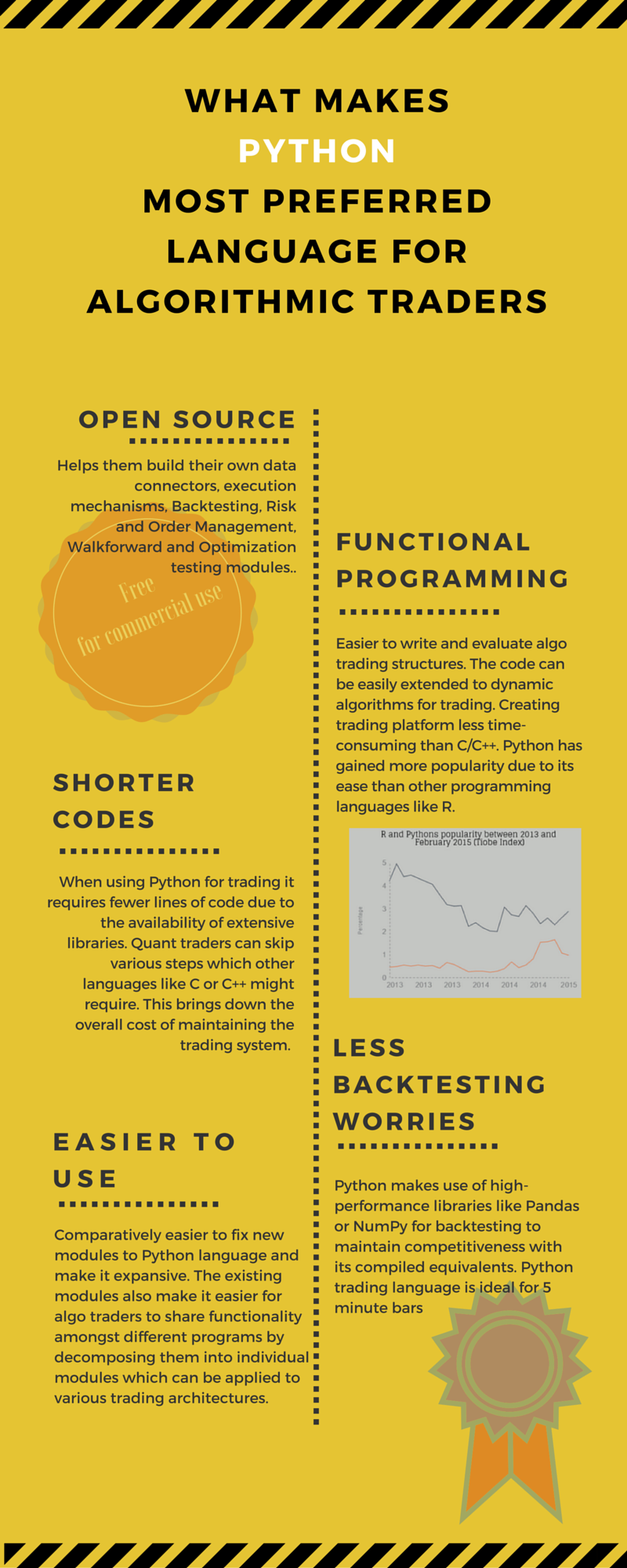Survival! Knowledge! Skills!
For people who wish to thrive in the competitive market of quantitative trading programming expertise in Python, C++ or Java is a must. The core concepts behind using these programming languages for algorithmic trading are same.
One of the most common questions that we receive at QuantInsti® is: “Which programming language should I learn for algorithmic trading?” The answer to this question is: There is nothing like a “BEST” language for algorithmic trading. But you could always look at Python, which is an entirely different game changer when it comes to Algo Trading.
What is Python?
Python is a free open-source and cross-platform language which has a rich library for almost every task imaginable and specialized research environment.
It is an excellent choice for automated trading in case of low/medium trading frequency, i.e. for trades which do not last less than a few seconds. It has multiple APIs/Libraries that can be linked to make it optimal, cheaper and allow greater exploratory development of multiple trade ideas.

What Makes Python Most Preferred Language For Algorithmic Traders?
Open Source:
Helps them build their own:
- Data Connectors,
- Execution Mechanisms,
- Backtesting,
- Risk and Order Management,
- Walkforward, and
- Optimization Testing Modules.
Functional Programming:
- Easier to write and evaluate algo trading structures
- The code can be easily extended to dynamic algorithms for trading
- Creating trading platforms takes lesser time as compared to C/C++
- Ease of using as compared to other languages like R
Shorter Codes:
- Using Python for trading requires fewer lines of code due to the availability of extensive libraries
- Quant traders can skip various steps which other languages like C or C++ might require
- This brings down the overall cost of maintaining the trading system
Less Backtesting Worries:
- Python makes use of high-performance libraries like Pandas or NumPy for back-testing to maintain competitiveness with its compiled equivalents
- Python trading language is ideal for 5-minute bars
Easier To Use:
- Comparatively easier to fix new modules to Python language and make it expansive
- The existing modules also make it easier for algo traders to share functionality amongst different programs by decomposing them into individual modules which can be applied to various trading architectures
Next Step
If you are seeking more information on Python libraries for Algo Trading, check out our blog-post. If you are a coder or a tech professional looking to learn automated trading from experts like Dr. Yves Hilpisch, have a look at our course Executive Programme in Algorithmic Trading (EPAT). The course covers training modules like Statistics & Econometrics, Financial Computing & Technology, and Algorithmic & Quantitative Trading. EPAT equips you with the required skill sets to be a successful trader. Enroll now!
For automated trading for beginners, EPAT offers a comprehensive foundation, combining theoretical knowledge with practical applications, making it an ideal program to start your journey into automated trading.
You can also check out our interactive course ‘Python for Trading‘ where you’ll get a hands-on experience on Python coding by coding and backtesting your own strategy plus a joint certification from QuantInsti® and MCX.


